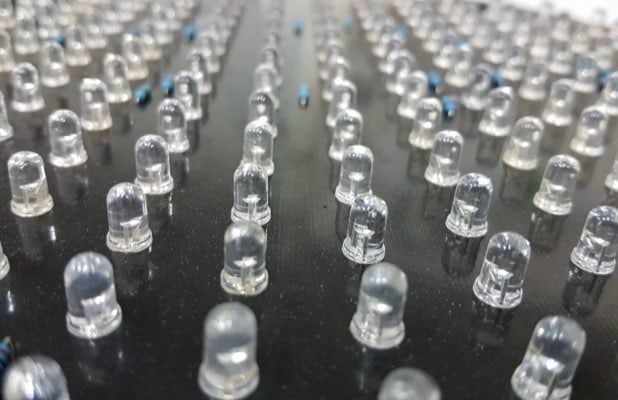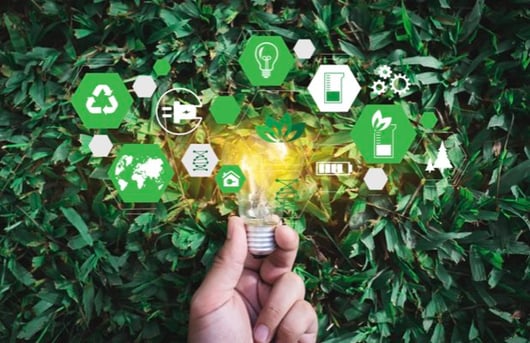
Lighting technology: a winning combination of light signalling and illumination
The implementation of a lighting project requires the study and evaluation of the most innovative technologies in order to develop state-of-the-art lighting solutions. Those working in the industry need to be aware of the latest trends in order to design and implement systems in line with market requirements. Here we present some of the fundamental and innovative aspects of the sector.
More specifically, we will look at the following topics:
- The lighting industry
- Lighting industry: LEDs
- Sustainable lighting: trends for 2022
- SLIM's solutions for the lighting industry
Lighting technology: what are the basic concepts and trends in the industry? Click on the button below and download the dedicated paper!
The lighting industry
Lighting technology is considered a technical-scientific discipline that, through the use of artificial and solar light, studies and implements the best lighting solutions for devices, spaces and environments. This term is commonly used to identify an articulated sector that encompasses the world of lighting. When we talk about the lighting sector, we, therefore, refer both to lighting projects related to design and architecture for the civil and industrial spheres, and to electrical engineering, namely the use of electricity in lighting devices, lamps and installations.
Looking at the evolution of the industry, lighting technology is increasingly involved in the development of important topics for the future such as sustainability, digitisation, electrification and the quest for individual well-being.
In fact, we are hearing more and more about Smart Lighting and Human Centric Lighting. These terms refer to intelligent, automated lighting control systems that enable a sought-after synergy between comfort and sustainability. These are lighting devices with sensors and wireless technologies that allow luminaires to be controlled, e.g. to automatically switch off lights and adjust their intensity according to natural light, thus positively influencing the well-being of the individual.
The world's leading event for lighting innovations is the international Light+Building trade fair in Frankfurt. One of the most important events in the world of lighting, which brings together the lighting, electrical engineering and automation sectors, will be back in attendance from 2 to 6 October 2022. The fair will be the meeting point for professionals involved in the design, planning and management of light, in all its forms and possible declinations.
Lighting industry: LEDs
LED, which stands for Light Emitting Diode, is a lighting device based on an innovative technological system using light-emitting diodes. Today, most lighting systems are based on this technology, which is advantageous from a design point of view. The LED is a flexible light source: a small light source that can be adapted to fit into a small footprint, which can be reduced in some specific applications, even through custom PCBs.
The benefits of using LED technology are reduced energy consumption and CO2 emissions: LEDs do not contain harmful substances such as mercury and have a longer lifetime than other solutions. LED lighting optimises energy consumption and helps fight thermal pollution. These light sources do not generate heat as other lamps do: they are able to keep it inside, avoiding dispersion.
In terms of sustainable lighting, LED is still the best technology today.

Would you like to know the basic steps for designing custom lighting fixtures with LED solutions and more? Click on the button below and find out the 7 most frequently asked questions for the design of lighting fixtures.
Sustainable lighting: trends for 2022
At a time when sustainability is a requirement shared and sought after by the entire global context, companies in the lighting sector have also embarked on a path of renewal in terms of respect for the environment.
Approaching the concept of sustainable lighting means carrying out lighting projects with greater respect for the environment.
The combination of ecological responsibility and technological expertise makes it possible to find sustainable lighting solutions that go beyond energy saving alone. In this sense, the industry's research and development centres are committed to creating products that are as innovative and environmentally friendly as possible in terms of production process, materials used, use and disposal options at the end of their lives.
Sustainability and energy saving were some of the topics we discussed with two lighting experts. Read more about "Developments in the lighting sector: an interview with Enrico Pianezzola" and "Developments in the lighting sector: an interview with Erica Turolla".

SLIM's solutions for the lighting industry
At SLIM we design and implement a wide range of lighting solutions, from standard and modular to innovative and customised. We start an initial evaluation phase with the customer to understand the requirements, technical and aesthetic needs and then suggest the ideal component.
Standard and modular solutions include indicator lights, panel lights and switches. More innovative solutions involve the study of new technologies, including the latest generations of LEDs and the application of side-emitting fibre optics with a custom SMD source.
The skills and know-how of the technical department are made available to customers to assess the type of final application, the light source, the luminous efficiency, the chromatic and aesthetic rendering and the spaces to work in. The ultimate aim is to integrate all these variables into a high quality Made in Italy lighting solution.
For further information on SLIM's light indicators, we recommend reading the article "Light indicators: everything you need to know".
If you are interested in a lighting solution, click on the button below and submit your request - we will be happy to help you!


